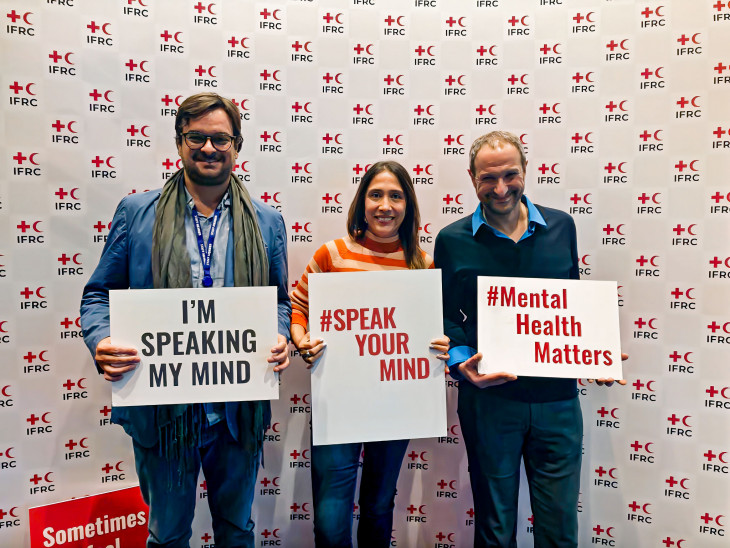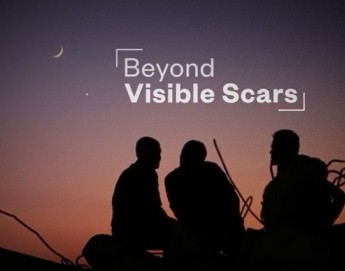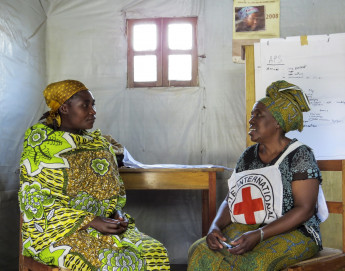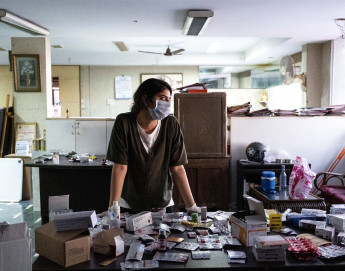
World Mental Health Day: In conversation with Milena Osorio
With World Mental Health Day just around the corner (10 October), we caught up with Milena over an imaginary cup of chamomile tea for some frank conversation on how we need to "walk the talk" when it comes to integrating mental health into our overall operational response. The writing on the wall is clear: No health without mental health.
Back to where it all began
The roots of the ICRC's MHPSS programme can be traced back to 2002–03, when – for the first time – a psychologist joined the team providing support to families of those missing in connection with the Balkans conflict.
For Milena, who grew up in Colombia, the discovery of the humanitarian in her happened early on.
I got the opportunity to study clinical psychology, and in 1997, joined Médecins Sans Frontières as a psychologist and worked there for 12 years, mostly in the world's deadliest conflict zones.
Drawn by the ICRC's mandate of ensuring humanitarian protection for victims of armed conflict and other violence, Milena started her journey with the Red Cross as an MHPSS delegate in Georgia (Tbilisi). There, she set up one of the first programmes to support families of missing people, soon taking the work to Armenia and Azerbaijan.
"While our engagement with families of the missing people was a dominant area of our MHPSS work in Georgia, Armenia, Azerbaijan and Nepal, the focus in the Democratic Republic of the Congo was on supporting victims of sexual violence. Our activities in all these places clearly demonstrated the importance of adding MHPSS to our services, paving the way for greater acceptance."
In 2013, Milena moved to the headquarters in Geneva, coaching and guiding the now-expanding MHPSS teams in the field, eventually becoming the programme coordinator in 2016.
We're but a microcosm of society
Often shrouded in secrecy and carrying the weight of stigma, mental health has moved to the top of the "let's talk ladder" over the past decade. The change is reflected within the ICRC too. "MHPSS is no longer seen in silos, but as a component that reinforces our work in the field. In fact, basis the impact that we've measured scientifically, we can safely say that providing mental health and psychosocial support can save lives."
Milena shares with us the result-based management approach adopted by her unit that has successfully shifted the focus to outcomes.

Milena with colleagues after the adoption of a resolution to address mental health and psychosocial at the 33rd International Conference of the Red Cross and Red Crescent Movement.
As exciting and memorable as this journey has been, it has also been challenging. The hardest obstacle, Milena tells us, has been connecting with the communities within a cultural context that they trust the most. "The last thing we want is to be seen as practitioners of Western medicine imposing an outside perspective upon communities. What we bring to the table is technical expertise. Everything beyond that is culturally adapted and inclusive of the local needs.
"While working in the Democratic Republic of the Congo, our initial assessment brought out that survivors of sexual violence often reached out to religious leaders for cleansing rituals to rid them of the 'curse' that they believed had befallen them. In this scenario, we included these religious leaders in our network of support, not only to pass on de-stigmatization messages surrounding sexual violence, but also to encourage them to refer those in need of MHPSS to us."
The flexibility of the team to adapt and maintain cultural relevance has helped them build precious trust with the communities, thus integrating the programmes into the local fabric.
It takes a village
While the focus of MHPSS programmes is always on the people we're trying to help, the touchpoints of support can change from one context to the other, depending upon the existing health infrastructure.
Capacity-building is our main modus operandi. We don't do substitutions; rather we aim to train various members and groups of the community, including community leaders, traditional healers, schoolteachers, health-care professionals and other first responders.
When working with families of the missing, the families themselves have proven to build the strongest support networks. "Besides the excruciating pain of not knowing the fate of their missing loved ones and constantly swinging between hope and despair, these families also face numerous legal, financial and administrative challenges to get the required aid.
"We try to build an ecosystem where they can connect and work together. This sharing of practical experience often brings them the most applicable solutions. It's a beautiful example of how something that's perceived to be so complex can be solved by something simple."
Overcoming great odds
Talking about people's resilience to cope with adversities, Milena calls it the most striking part of her work. "All of us have the ability to handle challenges and curveballs that life can throw our way. It's this ability to cope and be resilient that's essentially impressive. I'm amazed by how much people can push through and emerge on the other side."
In the middle of acute conflict in Darfur, Milena saw this magical quality at play in every person she worked with. "Due to the constant displacement from their homes, people were struggling to survive. Every morning, mothers and fathers would wake up with the single objective of fetching water and wood. At the end of long difficult days, they would return to ravaged structures they called home. There was no real hope of a better future. But they continued to smile and fetch that pail of water for their children and in the evenings gather around a small bonfire they had worked so hard all day to build. And they would never forget to offer us whatever little food they had."
Despite the hardships, something gave them the strength to overcome all odds.
During extreme trauma, sometimes people can lose the ability to activate this hidden strength. But if you help them find it, beautiful things can happen. That's where the stories of strength and resilience lie.
Self-help, over everything else
The COVID-19 pandemic has again illustrated the importance of providing necessary support to medical staff and mental health practitioners to deal with the extreme stress associated with their jobs. Since their work can get emotionally draining, the MHPSS team members too are encouraged to stay well and healthy.
Our number one rule is to never forget that to provide the best possible support, you need to be well yourself.
Besides being an ardent yoga enthusiast, Milena ensures that she stays as connected to field work as possible. "This is one of my best coping mechanisms."
But things can get tough for the team, especially due to the limited resources and the huge needs. Staying connected and having a well-functioning coaching system has helped them till now. "It'll be interesting to see how we further strengthen this network of support."
Bridging the digital divide
Talking about the hotline in Gaza and other such mechanisms that were put in place due to the pandemic, Milena says since the MHPSS programmes are based on proximity, replacing people with the internet is not the future. "Instead, using the strengths of the medium, i.e. giving us access to people we might not be able to reach physically and providing a degree of anonymity to people, we will consider incorporating appropriate digital solutions into our programmes."
The building blocks
- Include mental health support in the first wave of aid during humanitarian emergencies
- States and humanitarian agencies must strive to support health systems to respond to the mental health and psychosocial needs without delay
- Offer mental health support services that are adapted to the cultural context
- Address stigma, exclusion and discrimination against people with mental health needs
- Invest in quality professional workforce





